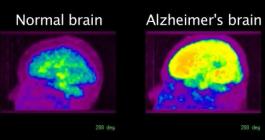A combined American and Swedish Research team has described the compound “Pittsburgh compound-C” (for short PIB), that glues itself onto amyloid plaques in the brains of Alzheimer’ patients. This gluey substance is responsible for the symptoms of dementia that plague the patients. These plaques can be detected by positron emission tomography, a test that is known as PET scan.
This may sound very high tech, but the significance of this is great: it allows researchers to look how Alzheimers begins, shows the progression and also demonstrates how effective drugs are at slowing down or reversing the disease. Dr. Klunk and his colleagues who share the research, note that it is possible to identify patients at high risk of early onset as much as ten years before symptoms of the disease show up. This is now even more critical as several new treatments for Alzheimers are being tested. Also as future medicines become available that work by preventing amyloid deposition, these early testing methods will be of utmost importance.
Reference: National Review Of Medicine, November 15,2004, page 15
See also the following links regarding Alzheimers:
1. Diagnosis of Alzheimer’s: http://nethealthbook.com/neurology-neurological-disease/alzheimers-dementia-and-delirium/alzheimers-disease-diagnosis/
2. Link About the Pittsburgh compound and PET scanning
Last edited October 27, 2014






